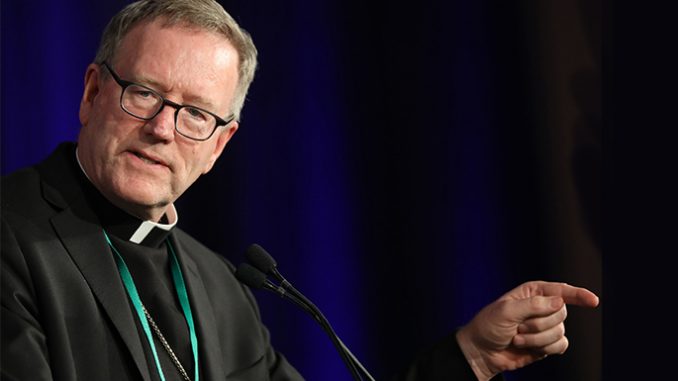
I usually ignore the writings of Michael Sean Winters at the National Catholic Reporter. However, a friend of mine emailed me a link to Winter’s latest piece. As I expected, it was the usual boilerplate about Pope Leo, Pope Francis, synodality, “listening to the Holy Spirit” and the need for the Christian Faith to have public consequences.
So far so good, with no earth-shattering insight into the signs of the times. And nothing with which any thinking Catholic could really disagree. But, apparently unable to help himself, Winters found it necessary, in an otherwise harmless and anodyne piece, to take a gratuitous swipe at Bishop Robert Barron and his Word on Fire Ministry.
The cynical weaponizing of “synodality” continues
Winters begins by quoting an excerpt from a recent homily of Pope Leo’s on the need for a “listening Church”:
How important it is to listen! Jesus says, “My sheep listen to my voice”. And I think it is important for all of us to learn how to listen more, to enter into dialogue. First and foremost, with the Lord: always listen to the Word of God. Then also listen to others, to know how to build bridges, to know how to listen without judging, not closing the doors thinking that we have all the truth and no one else can tell us anything. It is very important to listen to the voice of the Lord, to listen to it, in this dialogue, and to see where the Lord is calling us towards.
But then, out of the blue, he adds the following:
It is not difficult to imagine Pope Francis saying these words. They point to synodality and, critically, that we listen to each other to better listen to the Holy Spirit. The critics of synodality who complain it is precisely the kind of inward-looking experience Francis claimed to shun always leave out the part about listening to the Holy Spirit. Also worth noting is the absence of listening in various social media ministries such as Bishop Robert Barron’s Word on Fire. There, the answers are prepackaged and ready to be shared with the docile audience. That is not Leo’s approach.
Bishop Barron and Word on Fire are both quite capable of defending themselves, and this statement from Winters is so manifestly ludicrous that it stands in no need of refutation. But I am compelled to offer some response given that these comments from Winters are fresh on the heels of an equally nonsensical attack on Bishop Barron in the pages of Commonweal, a more substantive journal, wherein Bishop Barron was falsely accused of wanting to “bury Vatican II”.
The evidence provided for this alleged desire by Bishop Barron to bury the council was nothing more than Barron’s criticism of the “beige Catholicism” of the post-conciliar years, and the fact that Barron claims, along with Pope Benedict XVI, that the council should be read in continuity with the tradition and not against it. The fact that Commonweal saw fit to publish such exquisitely jejune “analysis” is sad, indicative in a darker way of an animus in search of an argument. (Bishop Barron directly responded to that essay in a May 28th post on X.)
Of course, such criticisms go with the territory, as someone with the immense public platform of Bishop Barron will generate criticisms, even silly ones. Nevertheless, it also goes with the territory for folks like me to push back against the bullies of the Catholic Left who for too long have been given a pass for their calumnies against fellow Catholics, who are neither strident extremists nor fevered Right-wing nut-jobs, but simply Catholics of a more traditional (and orthodox) persuasion.
Any Catholic with even an ounce of common sense can see how self-refuting Winter’s claim is that Bishop Barron peddles in prepackaged answers and caters to a “docile audience”. In a section devoted to the need for a Church where unity is achieved through listening and dialogue, it is clear Winters has done neither when it comes to Bishop Barron, or to “the critics of synodality”.
If Winters had truly “listened” to the critics of synodality, he would see that our complaint is not with synodality as such, nor with the need for the Church to listen to the Holy Spirit. Rather, we claim that the curated and stage-managed “synod on synodality” was not synodal at all insofar as its voting members were not truly representative of the Church at large.
Therefore, his criticism is a monumental exercise in question-begging. He assumes what he needs to prove: that the synod on synodality was a genuine listening to the Holy Spirit and the Synod was representative of “the people of God”. But this is precisely the point in dispute. Because curated and selective listening, where significant voices are conspicuously absent, is no listening at all.
Under-listening and 0ver-reaching
For example, why was Fr. James Martin, SJ, picked by the Vatican to be a voting member of the Synod but not the priest president of Courage International? Given the importance of the debates over homosexuality in the Church, it would seem that a genuinely “listening” Church would want to hear all voices (Todos!) on this very important and highly divisive issue. But the Synod organizers thought differently, which calls into question which “spirit” was indeed speaking through the Synod.
But Winters assumes the Synod was indeed a profound exercise in listening to the Holy Spirit. Therefore, anyone who dares criticize the Synod is an enemy of listening to the Holy Spirit. Winters does not seem to find it strange that for Catholics of his persuasion the Holy Spirit always seems to speak in the language of 1968, which raises enough red flags for the rest of us to step back and wonder whose voice is being heard?
Second, since his statement about Bishop Barron is so oddly out of the blue and utterly gratuitous, it gives every indication that there is an animus in play here against more conservative-leaning Catholics. His comments to the effect that Word on Fire is nothing more than a forum for offering canned and prepackaged nuggets of truth for a “docile” audience is prissy nastiness devoid of even the slightest merit.
It lacks merit because the rush to smear Barron proves too much. It indicts the National Catholic Reporter and any other Catholic internet resource where writers, speakers, and various noteworthy persons offer up their insights and thoughts on all manner of topics. Is all of that online content, including that of the Reporter, also “prepackaged” propaganda that does not “listen” to the faithful and is instead counting on an empty-headed, pietistical docility?
It lacks merit because Winter’s claim here seems to involve the bizarre notion that all forms of online Catholic content are, by definition, guilty of perpetuating a “non-listening” form of ecclesial discourse simply because they are the product of a planned production process. Somebody needs to write to the USCCB therefore and tell them that they are guilty of opposing a listening Church whenever they produce some brochure or video to be disseminated to parishes.
What Winters is really getting at with his condescending comment about “prepackaged answers” for a docile audience is his usual bilge about how awful Catholicism is when it dares to offer clear answers to people living in the “messiness of life”. What he wants instead is a Church whose leaders do not offer clear doctrinal answers to just about anything on the mistaken presumption that there are no such clear answers in the first place.
His criticism of Barron is important because it gives voice to a theological idea, whose pedigree stretches back into the late 19th-century and then into the modernism of folks like Tyrell and Loisy, that what matters most for most people is an inner religious experience of something ineffable that doctrines only obliquely express in propositional form. And for Winters and those like him, a Church focused on the truth of doctrine is a Church incapable of truly listening to the articulations of the faithful of that lived inner religious experience in the messiness of life.
Real dialogue with real people
Winter’s claims also lack merit since they ignore the fact that Word on Fire conducts numerous interviews with all kinds of different folks from varied walks of life. There is indeed a concerted effort to engage in real dialogue with all kinds of public intellectuals and to present that dialogue to the public. When was the last time Winters or the NCR produced anything of such intellectual depth and quality?
It lacks merit because the content of Word on Fire is anything but the simplistic argot of old-time pieties. I know many an average Catholic who loves to watch Bishop Barron but who tell me that much of what he says goes over their heads. This is not Victorian, parlor room “Church chat”. This is serious stuff, and I suspect folks like Winters know this, which is precisely why he seems to hate it so.
In other words, he is not worried that the theology of Word on Fire is inconsequential. He is worried that it is consequential. And that is what vexes him. He fears that what he views as this “retrograde, reactionary, and ultraconservative” form of Catholicism is far, far more popular and influential than his small gang of refugees from 1975.
In short, Winters wants bishops who have no answers and who seek only to hold the hands of the confused and lost in an act of solidarity with their apophatic darkness.
So-called traditionalists also dislike Bishop Barron since he does not sufficiently populate Hell to their liking and does not seem to be a strong advocate for the TLM or the liturgy wars in general. He embodies for them “the Vatican II Church”, which of course they also dislike, and continues to advocate for a retrieval of the Council in the hermeneutic of continuity and the light of ressourcement theology. This is enough to mark him as a quasi-modernist in their eyes, which means that Pope Saint John Paul II and Pope Benedict XVI are also quasi-modernists. In fact, even Pius XII seems a bit squishy to these folks since he dared to begin the “tinkering” with the allegedly unchangeable pre-1955 liturgy. So Bishop Barron appears to be in good company.
Therefore, Bishop Barron is disliked by both progressives and traditionalists (and probably a few others who are simply tired of what they view as the marketing ubiquity of Word on Fire). But I find it all exasperating. It has become tiresome to watch the Church, in her many members, cannibalize itself through these ideologically motivated attacks on her best and brightest.
Why is it not sufficient, even if you disagree with Bishop Barron on issue “X” or issue “Y”, to step back and acknowledge that he is an evangelizing bishop who has created something of great and lasting value? That Word on Fire has brought many countless souls to Christ and his Church? We have all been asking for decades for bishops who are not just managerial class apparatchiks and who are instead true evangelists of the Gospel for the people of today. And here we have one such bishop; but instead of applauding him, there are loud voices falsely vilifying him with every effort made to tear him down because he has chosen not to ride into town on our particular ecclesial hobby horse.
This is all very disturbing. We need to be able to see all ecclesial movements that have the “weight of glory” about them in a positive light, even as they are perhaps engaged in friendly critique. I am not a fan of the film series “The Chosen” but have refrained from public criticism of it since I can see that, overall, and despite some flaws, it has brought many souls to Christ and many people’s faith is fed and strengthened by it. So, why throw cold water on it? Why tear it down? Because it does have its great moments. For example, the profoundly moving depiction of the late-night meeting and conversation between Jesus and Nicodemus in Season One.
There are many a Nicodemus in our culture today. And Bishop Barron and Word on Fire have been highly effective interlocutors with them. One can indeed criticize this or that aspect of it all. But the animus and hatred and false characterizations should cease. That would be a real step toward a true synodality of listening.
If you value the news and views Catholic World Report provides, please consider donating to support our efforts. Your contribution will help us continue to make CWR available to all readers worldwide for free, without a subscription. Thank you for your generosity!
Click here for more information on donating to CWR. Click here to sign up for our newsletter.












